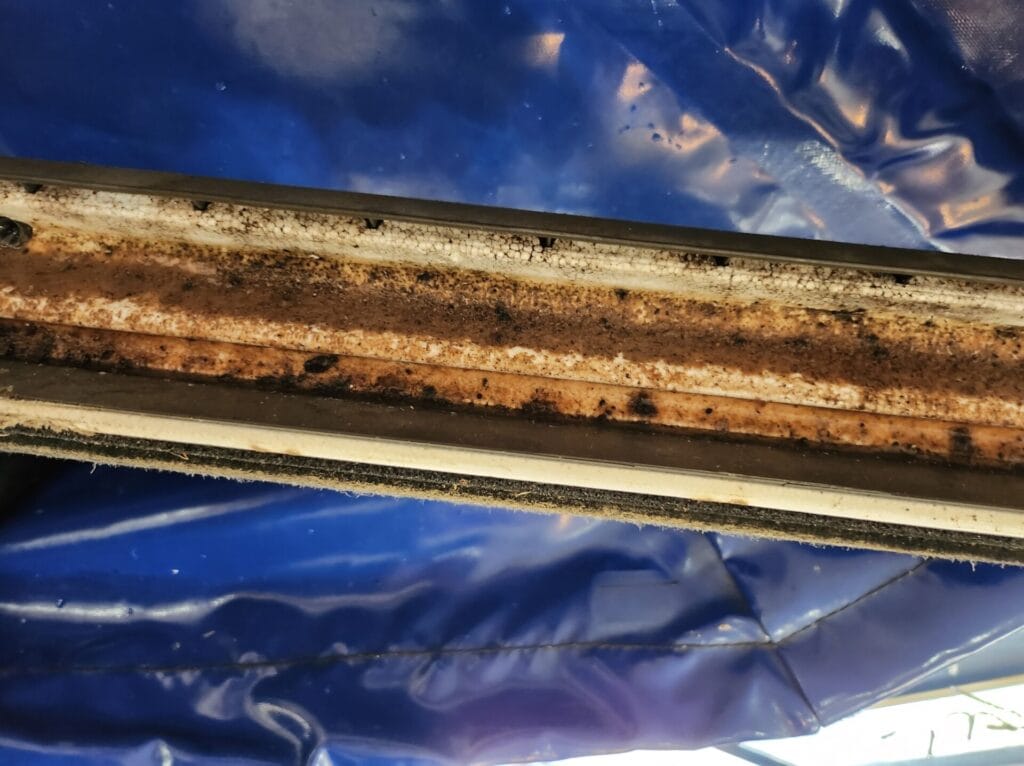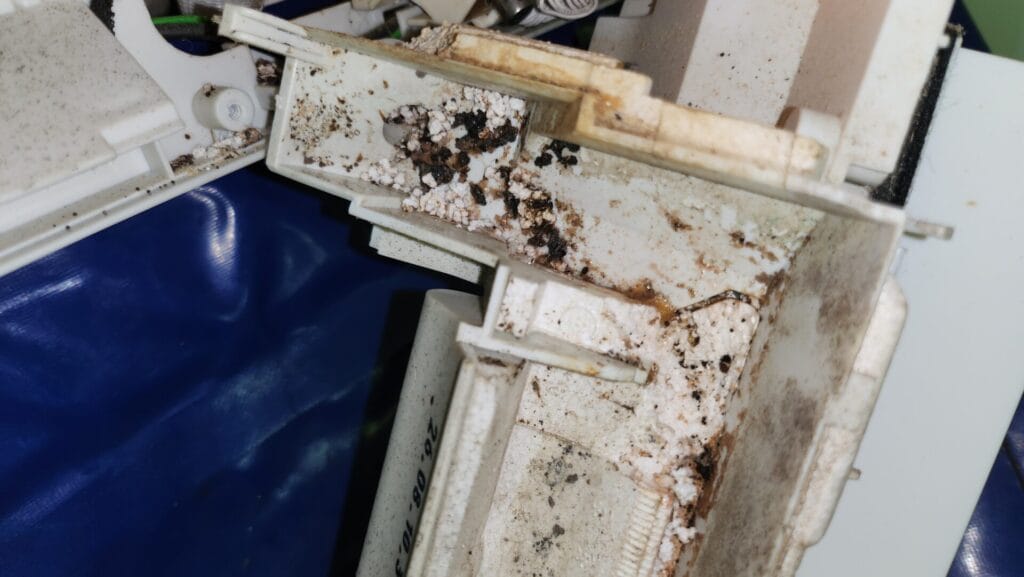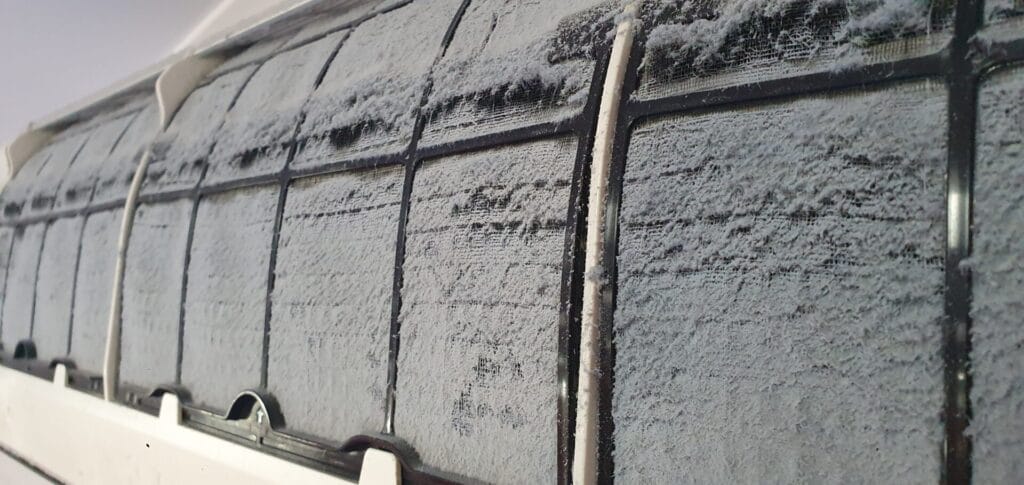By Spotless Clean Air Services – 1/06/2025

A Drip Today, a Disaster Tomorrow
Noticed a puddle forming under your air conditioner?
It might seem like a minor annoyance, but a leaking AC can quickly turn into a costly issue.
From water damage to system breakdowns, that little drip is your system’s cry for help.
Whether it’s an air conditioner leaking, aircon leaking, or AC indoor unit leaking water, understanding the cause is the first step to fixing it and preventing it from happening again.
Is It Normal for an Air Conditioner to Leak Water?
A certain amount of water is actually a byproduct of normal air conditioner operation.
Moisture from the air condenses on the evaporator coil and should drain away through a dedicated outlet.
But when that water ends up leaking inside your home or pooling outside excessively, it’s no longer normal.
It’s a problem. Especially if you’re seeing signs of an air conditioner water leakage or air conditioner dripping water.
How Air Conditioners Create Moisture
The Cooling Cycle and Condensation
As warm indoor air passes over the cold evaporator coil, humidity condenses into liquid water, just like a cold glass on a hot day.
This water drips down into the drain pan and exits the system through the condensate drain line.
The Role of the Drain Pan and Drain Line
The drain pan sits beneath the evaporator coil and collects the water formed by condensation.
From there, it flows into a small pipe called the drain line.
If anything disrupts this flow, water backs up and starts to leak.
That’s when water leaking from the air conditioner becomes noticeable.

Common Reasons Your Air Conditioner Is Leaking Water
Clogged or Disconnected Drain Line
One of the most frequent causes of a leak is a clogged drain line.
Dirt, algae, or mould can block the pipe, preventing water from draining properly.
In some cases, the line may become disconnected altogether, causing air conditioner water leaking inside your home.
Dirty or Blocked Air Filters
When air filters become clogged with dust and debris, airflow to the evaporator coil is restricted.
This can cause the coil to get too cold and freeze.
When it eventually thaws, it releases more water than usual and overwhelms the drain system, resulting in the air conditioner leaking water.
Low Refrigerant Levels
Low refrigerant can lead to a drop in pressure inside the system, which may cause the evaporator coil to freeze.
Like with blocked filters, the melting ice leads to a surge of water that your unit can’t handle efficiently.
It often appears as an air conditioner dripping issue.
Frozen Evaporator Coils
Frozen coils are never a good sign.
Aside from poor performance, they’re a leak waiting to happen.
Ice builds up due to airflow issues or refrigerant loss.
Once it melts, the excess water has nowhere to go, leading to air con water leak problems.
Damaged or Rusted Drain Pan
Over time, drain pans can crack, corrode, or shift out of position.
Even a small fracture can allow water to seep through, causing visible leaks and what appears to be an aircon leaking water issue.
Incorrect Installation or Tilt
Air conditioners must be slightly tilted backward to allow water to drain toward the outlet.
If installed level or forward-leaning, gravity works against the drainage system and causes an air con leaking water situation inside your property.

Indoor vs. Outdoor Leaks: What They Indicate
If your AC indoor unit is leaking water, it usually points to issues with the drain line, air filter, or coil.
Outdoor leaks, however, can signal excess condensation due to high humidity or a refrigerant issue that’s causing ice build-up and melt-off.
Location matters when diagnosing the root cause of an air con water leak.
Warning Signs You Shouldn’t Ignore
Musty smells near the unit
Water stains on walls or ceilings
Reduced cooling performance
Frequent system shut-offs
Puddles forming near vents or returns
These aren’t just symptoms of a leaking air conditioner.
They are early warnings of damage in progress.
How to Fix an Air Conditioner Leaking Water
Cleaning the Drain Line
Use a wet/dry vacuum to suck out any debris from the drain line.
For persistent blockages, a vinegar solution or special cleaning tablets can be flushed through the pipe to clear out mould or algae.
Cleaning/Replacing Air Filters
Dirty filters should be cleaned every 1–3 months, depending on usage and the situational environment.
This simple task restores airflow and prevents freezing, which helps avoid aircon leaking caused by overflow.
Inspecting the Drain Pan
Shine a flashlight under your unit to check the pan for cracks or corrosion.
If damaged, it will need to be replaced to ensure proper water containment and to prevent air conditioner water leak.
Addressing Refrigerant Issues
Only a licensed HVAC technician can handle refrigerant problems.
If you suspect a leak or low levels, don’t delay.
Operating with insufficient refrigerant risks permanent compressor damage and leads to recurring air conditioner water leakage.

When to Call a Professional Technician
If you’ve tried basic troubleshooting but the leak persists, or if you notice electrical hazards, ice build-up, or a complete system shutdown, it’s time to call in an expert.
Certified HVAC professionals have the tools and expertise to safely diagnose and repair air conditioner dripping water or complex drainage issues.
How to Prevent Future Leaks
Regular Maintenance Tips
Clean or replace filters regularly
Keep the area around your unit clear
Inspect drain lines and pans during seasonal changes
Ensure your AC is installed on a slight tilt if wall- or window-mounted
Importance of Professional Servicing
Schedule annual or biannual servicing with a qualified technician.
Preventive inspections catch small issues before they escalate into AC leaking water situations and keep your system running efficiently.

Stay Dry, Stay Comfortable
An air conditioner leaking water is more than just a nuisance.
It’s a warning sign.
Whether it’s a clogged drain line, air conditioner dripping, low refrigerant, or poor installation, addressing the issue promptly prevents damage and keeps your system working properly.
Routine care, timely repairs, and expert help when needed will ensure your home stays dry, comfortable, and cool all year long.